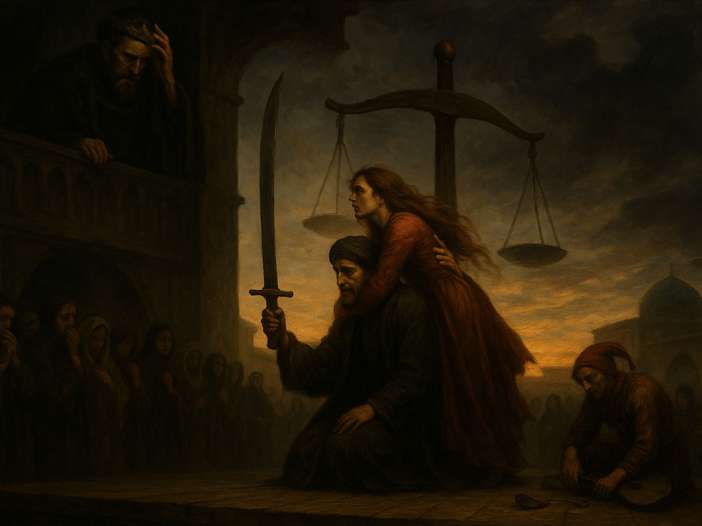
|
Getting your Trinity Audio player ready...
|
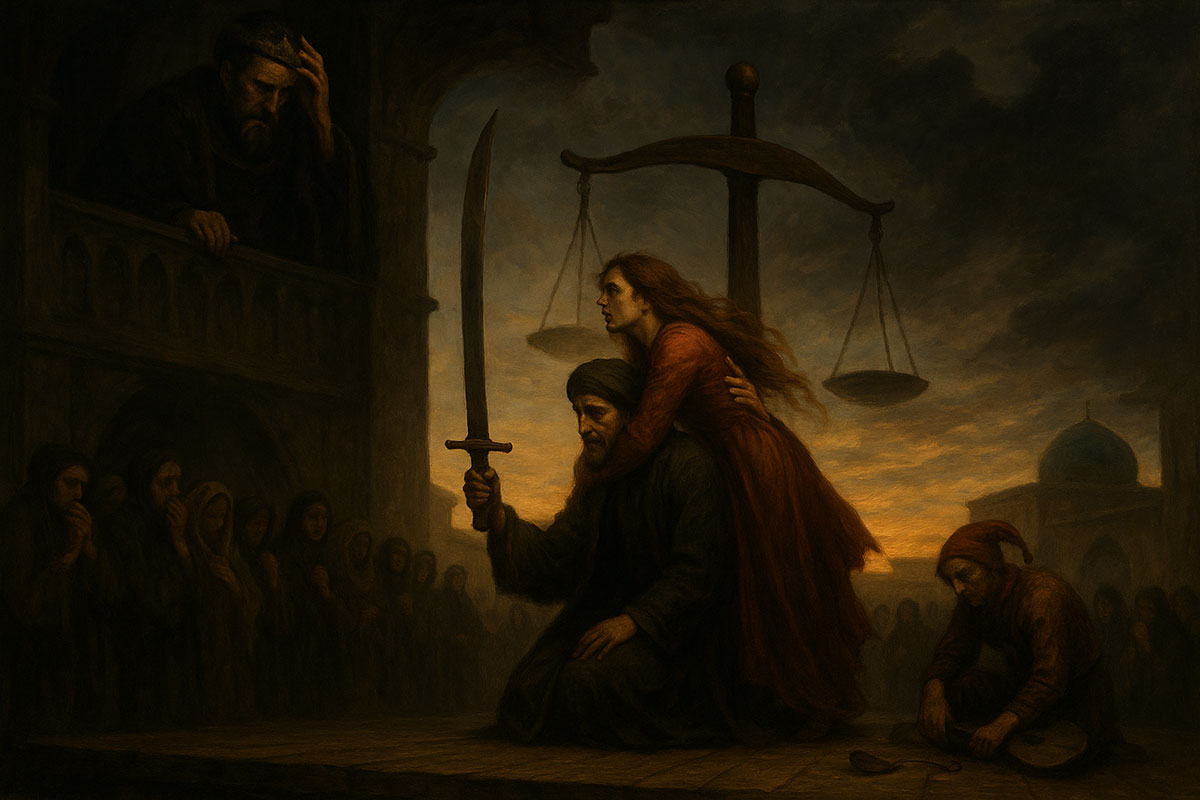
Shakespeare enters, quill in hand, speaking directly to the gathered company.
Good gentles all, lend me your quiet breath,
For now I bring a tale from furthest sands,
Where Samarkand, that jewel of the East,
Stands trembling at the mirror of her soul.
Here walks a man who keeps both night and dawn
Within his eyes, and with his hand makes lions
Of mere dust—yet is no king, nor priest,
But only one who dares to ask aloud.
Mark how a daughter, fire-struck with desire,
To cradle truth though all the world forbid,
Stands bright as Antigone, fierce as flame,
Against the fear that crowns her father’s brow.
And note the Emir, father, ruler both,
Who, torn betwixt his blood and throne, must choose—
And in the choosing, breaks what he would save.
A Fool attends, with spoon and lute half-cracked,
Who jests until his heart betrays its grief,
And speaks, unmasked, the sharpest truth of all.
The Oracle, with veiled and haunted tongue,
Foretells the cost: that fear shall reap its wage,
And love shall learn what law dares not forgive.
O friends, expect not mercy here at last,
But blood that blooms like roses in the sand;
And learn, with all who lend their ears to grief,
That crowns may break, but courage shall endure.
Thus enters The Sorcerer of Samarkand:
A tragedy writ in the ink of fear and fire,
Where daughter, father, stranger, Fool, and crowd
Show not strange shadows, but yourselves made bare.
Look well, and see—
For he that carries both the night and dawn
Still walks within your own remembering.

Act I — The Stranger Under Stars
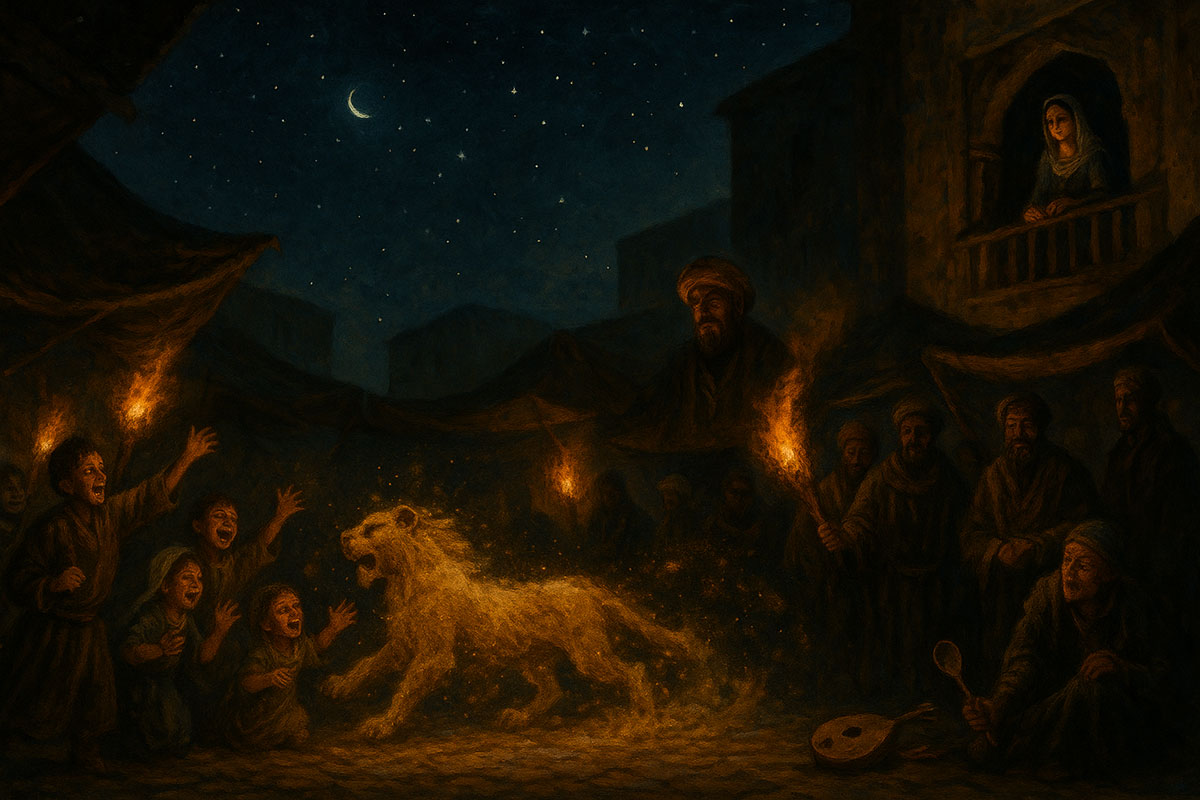
Scene 1 — The Eastern Gate at Night
Moon spilled like milk along the battlements. A lantern swings. Citizens cluster in cloaks; a guard leans on a pike. The Fool stands atop a water barrel, cracked lute on his shoulder, a bent spoon tucked in his sash.
First citizen
They say the stars tonight forgot their lanes.
Second citizen
Then they are Samarkandish, for so do we.
Guard
Back from the stones, all. The gate has ears and teeth.
Fool (singing, bawdy and bright)
A doctor sold a draught for fright,
but drank it first to prove it right;
he woke so brave he fought the bed—
and lost, poor man, his patient head!
Laughter rattles like cheap tin. Out of the dark comes a traveler: robe dust-burnished, staff in hand, eyes lit with the slow fire of constellations.
Third citizen (shrinking)
Who walks with lanterns in his eyes?
Guard (raising pike)
Name thyself and purpose.
Sorcerer
A thirsty man with dust in him and questions.
Fool (aside, the grin thinning)
His shadow steps before his feet.
Guard
Questions cost. Water more. Why should we open?
Sorcerer (mild)
Because fear, when chewed, is leather. Let the jaw rest.
I ask a cup and a little silence.
The guard hesitates, unsettled by the man’s gentleness; he nods. The gate yawns; the traveler passes in. The Fool hops down and trails after, whistling a nervous note.
Scene 2 — The Marketplace by Lantern-light
Shuttered stalls. A few night-buyers whisper. The Fool has gathered a ring of children. The Sorcerer kneels by the well, drinks, wipes dust from his throat.
Child
Sir, can you make lions?
Fool
He can, but they’ll eat taxes and leave nobles whole.
Sorcerer (to the child, smiling)
A lion is a manner of wind.
(to the dust)
Remember shape.
He passes his hand; sand lifts, braids, arches into a low prowling shape, mane flickering, then sighs into a harmless hill. Gasps; a cleric in the shadows scowls and signs against evil.
Cleric
Ape not the breath of Heaven.
Sorcerer
To wonder is to pray with the eyes open.
He moves to a sleeping beggar, breaks the last of his bread, sets it in the open palm.
Beggar (half waking)
Bless the hand I did not see.
Sorcerer (a small cough; it lingers, ordinary)
Bless the morning that will.
Fool (covering the hush with jest)
Good people, purchase my sovereign remedy for dread!
(holds up empty jar)
It is nothing—therefore cannot fail.
First citizen (half to himself)
If marvels are free, what price for silk?
Second citizen
I’ll buy fear; it’s always in stock.
The Sorcerer drifts on, the crowd’s laughter following, thinner now, as if thinking had stolen a tooth from mirth.
Scene 3 — The Emir’s Hall, That Same Night
High tile glimmering like a cool pool. The Emir sits wakeful; an attendant pours watered wine. The Oracle veiled stands within torch-smoke, statuesque.
Emir
Again the dream. A dome steps down to ash
as though ashamed to strike the earth.
What language speaks this ruin?
Oracle (voice a braided whisper)
My lord of Samarkand, attend the riddle:
Beware the man who carries night and dawn—
his tongue is balm and brand;
he blesses daughter, curses throne.
Her light shall be his grave, his truth her shroud.
Bar softly what you fear, lest you bar your heart.
Emir
Thy smoke writes wounds, not answers.
Oracle
Answers bruise kings more than wounds do.
Emir (hardening)
If such a man there be, I will be stone.
Let him break, not I.
The Oracle inclines her head. A torch gutters and steadies, as if a breath reconsidered.
Scene 4 — Zara’s Balcony
Garden murmurs. A book face-down on the balustrade; a small wooden doll, old and nibbled, sits like a witness. Zara leans into moon.
Zara (soliloquy)
How loudly stillness speaks when all is hushed.
By day I am a stitched and tended thing—
a daughter hemmed with gold, with steps for thread.
But O my mind outwalks my feet by miles.
I yearn to read without a license writ,
to wander alleys no one swept for me,
to cradle truth as if it were a flame—
and bear the burn as proof I lived at all.
Below, I saw a stranger’s lanterned eyes;
they kept both night and dawn, as if his gaze
were a horizon taught to look at once.
If danger be the toll for knowledge—good.
I’ll pay in breath, and count the price as bread.
Faintly, the Fool’s tune wanders up from the square, cheerful and afraid at once. Zara smiles, then shutters the smile.
Zara (soft)
If cages praise themselves as care,
then let me be ungrateful.
She picks up the doll, kisses its scarred brow, sets it back, and goes within.
Scene 5 — Morning Stir in the Market
Gray light, hawkers yawning, pigeons insubordinate. The bread-seller sets fragrant loaves. The Fool bargains for laughter.
Bread-seller
Two laughs for a copper? Child, your jokes are stale.
Fool
They keep. Like kings.
The Sorcerer approaches. He places a coin, then pushes it back and breaks a loaf for two children rubbing sleep from their eyes.
Bread-seller (softening)
You paid last night to a sleeping purse.
Take one for to-day; I’ll steal mercy’s change.
Sorcerer
Bread given while the world still dreams is double.
Cautious merchant (to another, eyeing the small crowd)
If awe is coin, we are beggars.
Second merchant
We cannot sell against a sky.
Fool (sliding between them)
Bottle it. “Wind, fine; keep sealed.”
It will spoil at once—buy two.
They snort despite themselves. A young student edges near the Sorcerer.
Young student
Master—if I call you so—how do you move the sand?
Sorcerer
By asking with my hands.
Respect makes better servants than command.
Cleric (arriving, stern)
And pride makes better fires than lamps.
Leave wonders to the Author of them.
Sorcerer (a flash under calm)
Who taught you He hates questions?
Fool (aside, quick needle to the audience)
Ah. Steel under silk. I smell a trial ripening.
Trumpets—thin daylight through brass. The crowd stiffens; the Emir’s herald strides in with guards.
Herald
By order of the Emir:
let the stranger be brought to judgment,
that law may weigh what rumor cannot.
Sorcerer (to the Fool, quiet)
Courts are mirrors that choose their angles.
Fool
Keep your breath. They charge silence by the cup.
The Sorcerer offers his staff without quarrel. The guards close, not rough. He coughs once—small, human. They go.
Scene 6 — The Council Chamber (Antechamber to the Hall)
A low room of cool tile. A priest, the cautious merchant, the young student, an elder scholar confer in hurried whispers. The Fool drifts in, pretending to be furniture.
Priest
Wonder is a fever. If we let it run, it burns the city’s faith.
Cautious merchant
And burns my trade by the same heat.
Elder scholar
Customs bind the roof beams. Pull one, the house forgets to stand.
Young student (torn)
But if questions be beams we never set—
perhaps the house is lower than it might.
Fool (blurting, as if tripping into truth)
Better eyes that doubt than eyes sewn shut.
All look at him. He blinks, as startled by himself as they are. He covers with a grin.
Fool
Forgive. My spoon spoke.
Priest (curt)
We will petition swift judgment.
Young student (low, to himself)
If law be heavy with fear, it breaks what it weighs.
Scene 7 — The Emir’s Oratory (Private)
A narrow prayer-niche. On a small shelf: the wooden doll from Zara’s childhood. The Emir enters alone, leaves his crown on a stool, takes the doll as if it were fragile music.
Emir (prayer)
Lord who measures kings by measures small,
I am a father first, a king by habit.
I held this toy when teeth of milk were brave;
she bit the world and laughed to see it give.
Now I am gnawed by news I do not trust:
a man who keeps both darkness and its cure.
If he be torch, I fear his light on me;
if tinder, I fear the fire in my name.
Teach me: am I a hinge for wisdom’s door
or bar across it?
(he kisses the doll’s brow; breath catches)
Let me not save her soul by starving it.
And if I err, O God of weights—
tip me where I break, before I break her.
He sets the doll down with reverence, takes up the crown as if it were heavier than earth, and goes.
Scene 8 — Zara’s Balcony Overlooking the Street
Procession below: guards leading the Sorcerer toward the hall. Citizens peel back like reeds. Zara appears above, unveiled, lit with a steady inward fire.
Zara (calling softly first)
Stranger—
He lifts his face; their eyes find one another and hold.
Zara (clear, fierce as prayer)
Hold fast your courage.
If truth be weighed by fear, I will break the scale.
Sorcerer (grave tenderness)
Daughter of dawn,
keep your light unafraid.
I will stand so you may walk.
Fool (to the crowd, jaunty to hide a prickle)
Now to market for justice!
Mind your change and test your weights.
Chorus of citizens (murmuring, braided)
Justice—wonder—bread—blasphemy—
Weigh it—say it—save it—cut it—
Who pays—who pays—
They move toward the hall. The morning sharpens; shadows shorten like held breath. Far off, a single crow writes a crooked letter across the sky.
[End of Act I]
Act II — Wonders and Suspicions
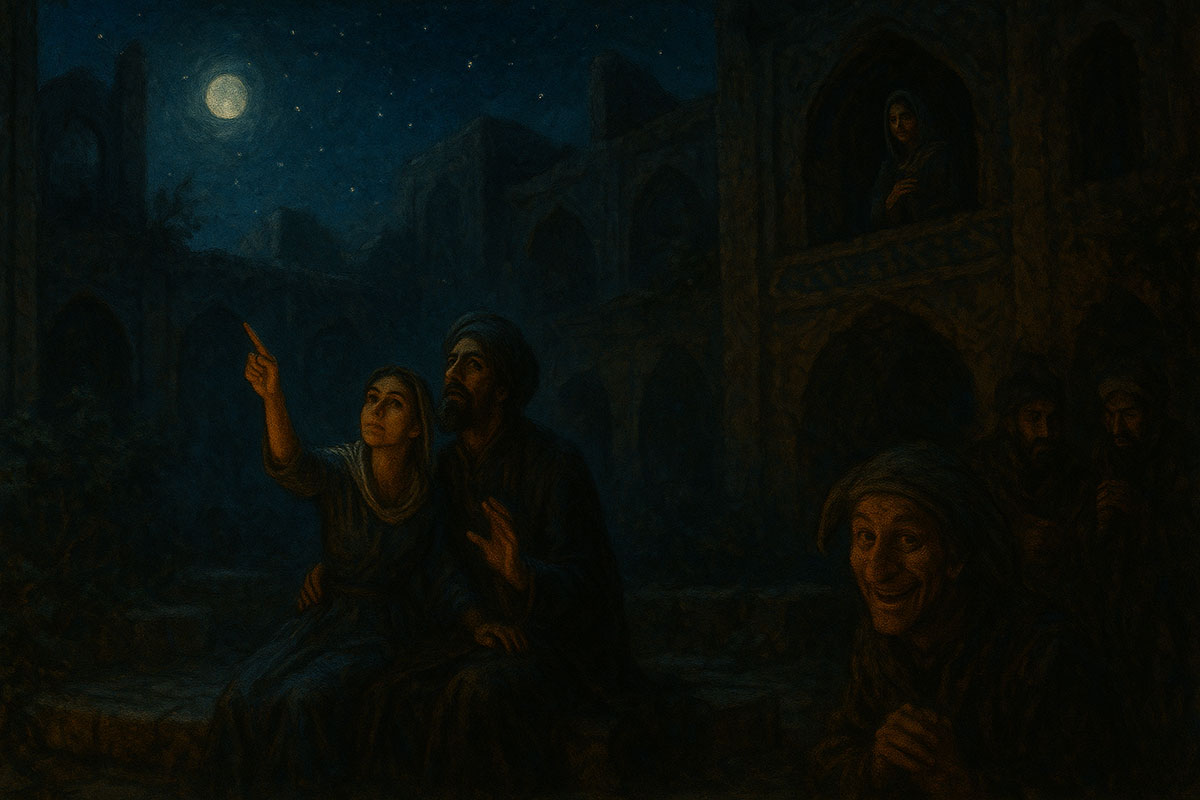
Scene 1 — Evening in the Marketplace (Lanterns and Spice-smoke)
Lanterns string a warm avenue above stalls. Children squat in a ring around a pale sweep of sand. The Fool lounges upon a date sack, cracked lute in lap, bent spoon in sash. Merchants hover with pinched arithmetic in their eyes. The Sorcerer steps into the ring, bareheaded.
Child
Make the lion breathe!
Second child
A river! Make a river through the sand!
Fool (grinning)
A river through the sand? Behold the city’s purse after taxes.
Laughter loosens; the Sorcerer lifts one hand. Sand shivers, climbs, combs itself into a low, padding lion; it inhales a hush, exhales a sigh, then melts back to dune.
Children
O—!
Cautious merchant
Such marvels steal the market’s breath. When breath goes, coin follows.
Second merchant
A man who sells amazement makes poor room for silk.
Bread-seller (half-admiring, half-wary)
If eyes are full, bellies go wanting.
Cleric (stepping forward, stern)
Leave miracles to the Author. Pride usurps the pen.
Sorcerer (a flash of heat under calm)
Who taught you God forbids astonishment?
Cleric
And who taught you God hires street magicians?
Sorcerer (softer)
I sell nothing. I ask men to look.
Fool (to the crowd, covering the tremor with jest)
Fear not; if wonder becomes tax, I’ll forge receipts—
(brandishes the bent spoon)
with this sceptre of stew.
Some laugh, others cross themselves. A mother hushes her child; a beggar watches the Sorcerer with shy gratitude. The Sorcerer coughs—small, human—and nods to the children.
Sorcerer
To-morrow I’ll show you how wind remembers shape.
For to-night—remember kindness.
He shares a heel of bread with the beggar, then moves on. The merchants count air as if it owed them something.
Scene 2 — A Ruined Madrasa Garden (Moonlit Arches)
Moonlight drops through a broken arch. Vines clasp old learning. A narrow gate creaks; Zara enters veiled, a maid lingering in the shadow as lookout. The Sorcerer waits, hands folded, eyes bright as if reflecting more stars than the sky can spare.
Zara (lifting the veil)
I have stolen an hour—from sleep, from fear.
If I must pay it back, let me pay in wisdom.
Sorcerer (with a small bow)
You bring more courage than courtiers bring swords.
Zara
Teach me the habits of the stars, not only their names.
Sorcerer
Names are nets—good to catch a shape, ill to hold its living.
Look: there the Archer, whose arrow never lands.
There the Balance, weighing what our tongues excuse.
There—two fish bound by a thread, swimming opposite.
Zara (half-smile)
Like duty tugging one way, desire the other.
Sorcerer
Like that.
Zara (after a breath)
By day I am obedient furniture, polished and placed.
By night I am hunger in a human shape.
I would read without leave, walk unescorted,
hold truth like fire and keep the burn as wedding ring.
Sorcerer (a proud spark)
Then you would scandalize a city that dines on fear.
Zara (light laugh that trembles)
Teach me scandal.
(plain)
I thought I loved your knowledge.
I find I love the hand that sets it free.
Sorcerer (caught between tenderness and warning)
Love what woke you. If I am that—bless me.
But know: truth burns and blindness blames the flame.
Zara
Let me be lamp and oil together.
Sorcerer
Then learn the cost.
A city fears a woman who can read her chains.
They drift beneath the arch; he traces a slow constellation with his finger upon the air. Her face takes that faint geometry and keeps it.
Zara (soft, fierce)
If dawn finds you condemned, I will not remain an heirloom.
I will be the question your judges cannot answer.
Sorcerer (gentle)
Be both question and keeper of the day after.
If I am ash, you be flame.
A distant footfall; the maid gestures urgently. Zara lowers her veil. Their eyes say what words cannot purchase.
Zara
Till dawn, beloved teacher—
and after dawn, beloved still.
She goes. He stands a moment in silence, then exhales—half prayer, half discipline.
Scene 3 — The Scholars’ Chamber (Lamplight and Argument)
A long table; ink smells like sober weather. The priest, the cautious merchant, the young student, and an elder scholar sit. The Fool slips in with the humility of a cat caught singing.
Priest
He trespasses upon the Sabbath of creation.
Cautious merchant
He trespasses upon my takings.
Elder scholar
He trespasses upon order—
and order is the knitting that keeps thin cloth from shame.
Young student (torn)
If order forbids the eye its hunger, is it order or a muzzle?
Priest
Questioning the muzzle is how bites begin.
Cautious merchant
And bites subtract coin.
Young student
I saw the children tonight—their faces turned like flowers.
Is it sin to water flowers?
Priest
When they bloom toward idols, yes.
Elder scholar (measured)
This city is a roof built by custom. New beams must prove their temper.
Let the Emir weigh the timber.
Fool (sidling, then blurting before he can stop himself)
Better eyes that doubt than eyes sewn shut.
Silence falls. The line lands like a coin that rings too true to be counterfeit. The Fool blushes, hides behind a grin.
Fool
Forgive. My spoon speaks out of turn.
Priest (recovering authority)
We petition judgment. To delay is to teach disobedience how to dance.
Cautious merchant
Put price to wonder before wonder sells us all.
Young student (low)
May the scale be honest. I have seen fear hide weights in sleeves.
Elder scholar
Fear is a craftsman. It hides nails where hands won’t look.
Scene 4 — The Emir’s Oratory (Before Dawn)
A narrow recess; a prayer rug; the small wooden doll waits on a shelf. The Emir enters, crown in crook of arm like a tired bird. He sets it down, takes the doll as if it might remember.
Emir (soliloquy)
Lord of weights and measures, who counts men by their smallest truths—
I am father first… I think.
I held this toy when Zara’s teeth were brave;
she bit the world and laughed to hear it give.
Now I hear a riddle wrapped around my house:
a man who carries night and morning both,
blessing my child, burning my name.
(he looks up)
If he be torch, I fear the light on all my shadows.
If tinder, I fear the fire will call itself my justice.
Teach me which fear is faithful.
What is a king whose daughter’s eyes accuse him?
What is a father whose crown speaks louder than his blood?
(he kneels)
If strength means stone, make me mountain against madness;
but if strength means mercy, make me river.
(he presses the doll to his brow)
Let me not save her soul by strangling it.
Let me not call love “law” to excuse my dread.
(he rises, heavier)
Dawn will pry an answer from my mouth.
O God—teach my mouth the shape of mercy,
or else break it before it speaks.
He replaces the doll carefully, takes up the crown, and goes—half soldier, half penitent.
Scene 5 — The Square at Graylight (Before the Trial)
Porters stretch; mothers parcel bread to small hands. The Sorcerer stands at the edge, looking toward the Hall. The Fool tunes his lute; it resists. The young student approaches with a book tucked like contraband.
Young student
If they silence you, who will teach us to look up?
Sorcerer
The sky will teach you—if you give it time.
Failing that, listen to silence after crowds go home.
Bread-seller (offering a crust)
Stranger—breakfast. It forgives the night.
Sorcerer (accepting, then sharing it with a beggar)
Let the forgiveness travel.
Fool (peering at the Sorcerer)
Keep your breath. Courts bill by the gasp.
Sorcerer (half-smile)
I have paid in dust enough.
Cautious merchant (to the priest, passing)
If the Emir favors wonder, markets will fail.
Priest
If the Emir favors mercy, heaven will fail.
Fool (to us, a thin slice of iron under sugar)
A man can fail better than either—
watch him try.
Trumpets far off—brass imitating sunrise. Citizens look at one another as if seeking smaller answers in familiar faces. No one finds one. They drift toward the Hall like filings to a hidden magnet.
[End of Act II]
Act III — The Trial of Wonders
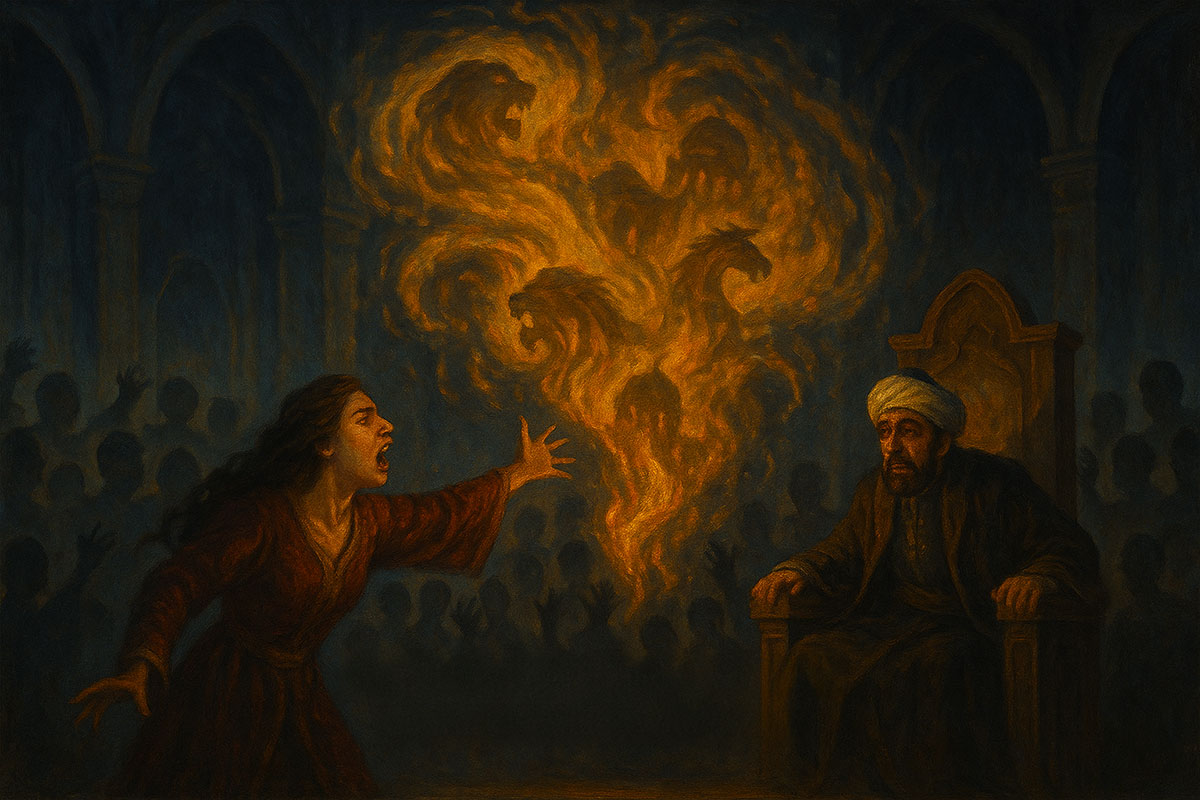
Scene 1 — The Emir’s Hall of Judgment
Tall pillars, torches spitting. Citizens crowd like uneasy reeds; merchants in stiff robes, priests in thick silence, porters, mothers, beggars. The Fool loiters by a pillar, plucking one discordant note from his lute. The Sorcerer is brought in, unchained, head high.
Herald
By decree of the Emir, Samarkand shall hear
whether marvels bless or blaspheme.
Let speech be witness; let law be stone.
Priest (striding forth)
This man toys with elements not his to wield.
He tricks children with lions of sand.
If we smile, blasphemy thrives.
If we frown, faith still suffers sight.
Better he be cut off than wonder be our master.
Cautious merchant
He empties stalls without touching them.
When eyes are full, purses empty.
Will he pay tax for amazement?
Trade cannot breathe when breath is free.
Sorcerer (steady, with a heat under calm)
I sold no marvel, only urged men to look.
Is it heresy to ask the wind its memory?
Is it theft to remind the hand of mercy?
If sand forgets its lion, blame the wind, not me.
Fool (aside, mocking the priest)
When faith fears sight, faith’s eyes need trimming.
Scene 2 — Zara’s Defiance
Sudden stir: Zara bursts into the hall, veil thrown back, hair like dark flame. Citizens gasp; guards hesitate. The Emir rises, torn between outrage and dread.
Zara
If truth dies, so do I!
If fear is king, let me be traitor to fear.
You call him plague; I call him mirror.
If law be heavy with dread, then let it weigh me first.
Emir (hushed, desperate)
Daughter, silence. Your tongue imperils both crown and blood.
Zara (burning)
If crown and blood are enemies, then let blood prevail.
I was born of womb, not of throne.
I will not be pawn to a fear that strangles fathers.
The crowd murmurs, torn; a mother sobs, clutching her child tighter. The Fool plucks a sudden bright chord, then lets it sour.
Fool (to us)
Behold: truth wearing a girl’s voice—
and men cover their ears with crowns.
Scene 3 — The Sorcerer’s Vision
The Emir motions; silence grips. The Sorcerer kneels, spreads sand from his sleeve on the floor. He breathes, and the grains stir like ash on restless wind.
Sorcerer (voice rising)
You seek proof?
Then look not at me, but at yourselves.
Sand lifts; visions spread upon the floor like mirrors alive. Citizens see domes collapsing, fires raging. A guard laughs at a warning, then turns to ash. A festival spark leaps, and the crowd applauds instead of stopping it. Finally, the Emir crawls through ruin, crown aflame, crying Zara’s name.
Citizens (crying out)
I saw my stall—!
That was my child—!
It was me—it was me—!
Priest (furious, trembling)
Sorcery! Trickery! Smoke to bind weak minds!
Young student (half crying)
No—he showed us to ourselves.
Fool (murmuring, dark wit)
Two mirrors make a maze. Which turn leads out?
Emir (faltering, shaken)
Is this truth—or the snake’s tongue?
Answer, Oracle—!
Oracle (stepping forward, veiled, solemn)
The man who carries night and dawn
shows what is, what was, what may be.
Which you call trick, which you call truth—
that choice is yours, and so the curse.
The crowd murmurs louder, voices colliding like waves.
Scene 4 — The Chorus Chant
The Chorus steps forward, half-citizens, half-echoes. Their voices find a rhythm, chant-like, building into a drum of complicity.
Chorus
Who pays? Who pays?
The stall? The prayer? The crown? The child?
Who pays the price of wonder?
Who pays the cost of fear?
We feared—so we obeyed.
We obeyed—so we became fear.
The chant repeats, louder, the citizens shifting uneasily, some pressing hands to ears as though sound itself accuses them.
Fool (stepping into their rhythm, almost dancing)
Drum, drum, citizens—beat the blame like a rug.
But dust belongs to all of you.
He stops suddenly, face caught by sorrow, dropping the mask for a moment. He grips his bent spoon like a relic.
Fool (low soliloquy)
I jest to keep the world from biting me.
But every laugh I sell returns with teeth.
This city strangles itself with jokes it cannot hear.
O God, lend me a tongue too sharp for silence.
He breathes, shakes himself, and slaps his lute as if to wake it.
Fool (loud, jester again)
Buy a miracle, good sirs! It fits any purse,
lasts forever, and cannot be returned!
Scene 5 — The Emir’s Struggle
The Emir grips the rail of his dais. Sweat beads. He stares at Zara, then at the Sorcerer, then at the citizens—half-terrified, half-hungry.
Emir (to himself, torn)
If I free him, fear eats me.
If I kill him, truth eats me.
If I silence her, my heart goes deaf.
Stone is the king’s duty—
but what father can be stone to his child’s fire?
Zara (pleading, fierce)
Father, for once let blood weigh more than throne.
Fear builds houses of ash.
Love builds cities that last.
Emir (half to her, half to the gods)
You tear me in halves that neither heals.
If I err, O heaven, strike me—
and not her.
The crowd surges with noise—half demanding death, half begging mercy. The Oracle stands silent; the Fool’s lute rings one thin note, hanging like a question. The Sorcerer watches, proud and calm, yet his eyes show the ember of pride that will not bow.
[End of Act III]
Act IV — The Curse of Fear
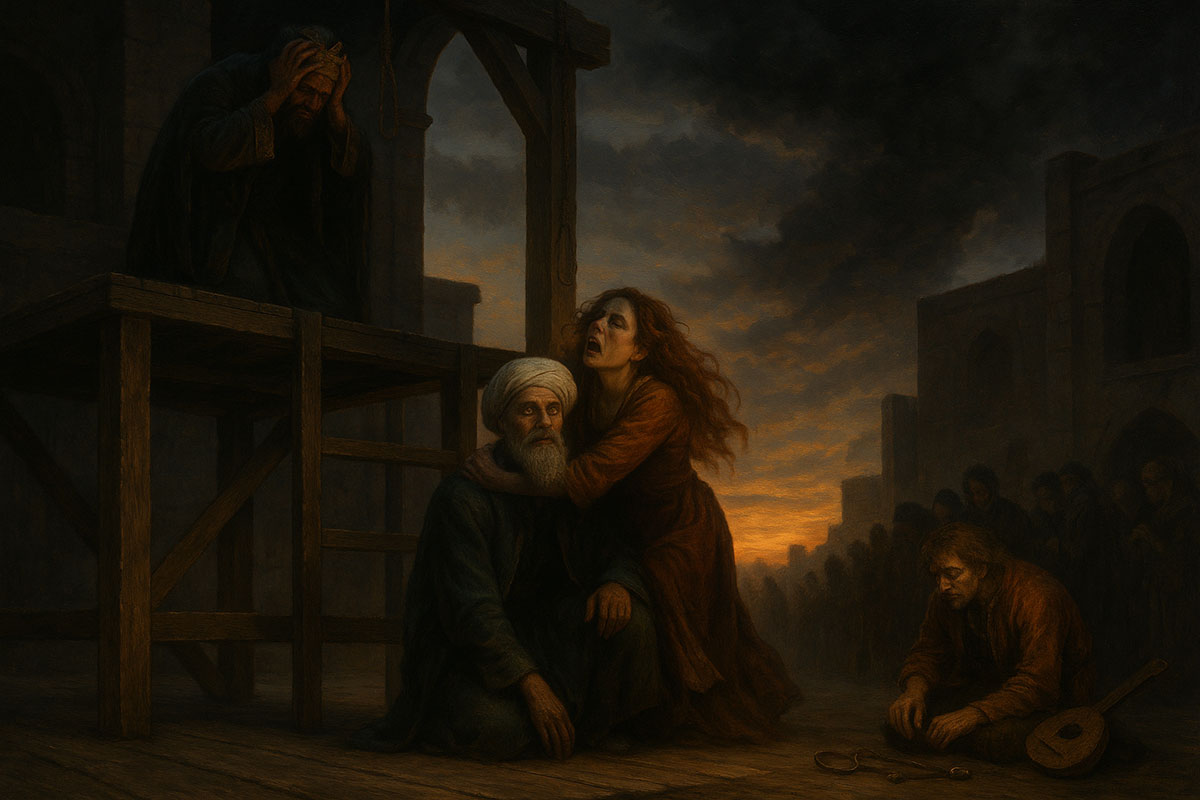
Scene 1 — The Judgment at Predawn
Torches gutter; dawn presses a thin gray finger under the doors. The Emir sits robed in state, a scroll before him like a naked blade. The Oracle stands veiled to one side; priests and councillors hold their breath. Guards bring the Sorcerer in, unchained but ringed with spears. The Fool lurks near a pillar, pretending to tune a stubborn string.
Emir (ritual calm)
Samarkand has watched her own reflection
and called it sorcery.
We sought what law demands when fear is loud:
a weight that does not tremble.
I, Emir, servant of order and father to Zara,
declare: at dawn’s first note, the stranger’s breath shall cease.
Let Heaven correct me if I err.
Sorcerer (steady, with a flash beneath)
Heaven corrects through men who dare to listen.
Priest (quick)
Silence the blasphemer.
Emir (raising palm; to the Sorcerer)
Speak no more.
When men shiver, rulers must be stone.
(voice softening one grain)
Stone breaks too—
but breaks more cleanly than water.
(to captain)
Hold him till the light.
Oracle (the faintest tremor in her veil)
The man who carries night and dawn
has reached the narrow bridge.
Some cross by mercy.
Some by pride.
Some fall for lack of either.
The Sorcerer inclines his head to the Oracle; the Emir dismisses all with a motion. The hall empties in uneasy eddies. The Fool remains, a bent smile on a breaking face.
Fool (aside)
The sentence wears a robe, but its feet are bare.
We shall see where they step when blood is on the floor.
Scene 2 — Zara’s Chamber
A small room with a narrow window chiseling the dark. A wooden chest, a prayer rug, a chair with a shawl thrown across it. Zara paces, hair unbound, veil like a storm cloud in her fist. Two attendants hover like frightened doves.
Zara
They mean to teach the city how to die.
They’ll call it order while the light goes out.
Attendant one
Lady, plead once more. The Emir loves you.
Zara (fierce)
He loves me with a rope.
What use is love that keeps a woman small?
Truth scratches at our door and Father bars it with his crown.
Attendant two (whisper)
They will bind you if you rush the square.
Zara
Let them bind my limbs; they cannot bind my cry.
The Fool slips in sideways, as if the room were a joke he should not be telling.
Fool
Good mistress, the law has dressed for church
and borrowed the strangler’s gloves.
Do not put your throat within the fingers.
Zara (whirling)
I will not live to polish a murder with obedience.
If he dies, I must hold the other end of the blade.
Fool (mask slipping; earnest)
Live, and hold a bucket when the city burns.
Dead water quenches nothing.
Zara (softer, but fixed)
If I live and say nothing, I am the fire.
She throws the veil over her hair with the violence of a vow.
Zara
Open the door.
The attendants flinch; the Fool blocks the jamb with a shrug and then steps aside, beaten by the look in her eyes.
Fool (low)
If courage were coin, you’d buy us all a better morning.
Zara is gone in a whirl of cloth and breath. The Fool stares after, then presses his brow to the bent spoon as if it were a relic.
Scene 3 — The Sorcerer’s Cell
A small stone chamber, a window bar cutting the sky into two poor poems: ash and pearl. The Sorcerer sits, palms resting open on his knees. He coughs once, smiles at the stubbornness of the body, then looks outward. Footsteps—Zara bursts in, attendants pleading behind her.
Zara
I stole the key with my name. There is still time to run.
Sorcerer (standing; a proud spark, then tenderness)
Run where?
We are already at the edge the world keeps for truths it fears.
If I flee, I teach them that fear was right.
Zara (grips his hand)
Teach them with your life, not with your blood.
Let us be flame that moves, not ash that warns.
Sorcerer (searching her face)
You would be lamp and oil together.
Zara (smiling through fury)
I would be the hand that holds the lamp when men blow on it.
Sorcerer (voice deepening; the flaw glints)
My pride is a beast I’ve kept too tame for kings.
It steps forth now, and will not kneel.
(then soft)
Forgive me that I choose the harder teaching.
Zara (tears bright, not falling)
There is a harder one. Live—
live and be mocked, live and be doubted, live and still be kind.
That is a longer blade than death.
Sorcerer (breath catches; he touches her cheek)
You shame me into loving the world.
(he steadies)
If the stroke finds me, carry the stars.
Let wonder be your ordinary.
Marry mercy to your anger and you will give this city children made of day.
Zara
If the stroke finds you, it finds me.
Truth lives in both.
(her palm on his chest)
It beats here—and here.
He draws her into an embrace that is both bridal and battlefield. A guard coughs at the door, ashamed of his duty. They part, fixing each other with last looks that do not believe in last looks.
Sorcerer (to the guard, gentle)
Tie my hands loosely.
If your conscience must be bound, let it breathe.
Guard (awkward, hushed)
I… will do what I can without being seen.
Zara kisses the Sorcerer’s brow, turns to go, turns back, cannot leave, and then tears herself away.
Zara (at the door, a vow thrown backward)
If law is a weight, I will be the finger that tips it.
She is gone. The Sorcerer closes his eyes, inhales as if memorizing the air.
Scene 4 — The Corridor Outside the Cell
Torches lean and hiss. Two guards lean too, trading tough whispers that fray at the middle. The Fool saunters in, singing a tavern line off-key, then stops dead, eyes bright as a wound.
Fool (sudden, flaying)
You polish the blade with your own beards, friends.
You oil the rope with tears you’ll weep later.
He’s your lantern—snuff him, and stub your toes for generations.
First guard (bluff, not brave)
Mind your bells, clown.
Second guard (thin laugh)
He juggles words; we juggle heads.
Fool (stepping close; the jest gone)
Listen while a jester borrows a prophet’s throat:
You are killing yourselves.
When the city gropes in dark to-morrow,
you will be the walls that bruise it.
Silence. The guards look away, ashamed of nothing in particular and everything at once. The Fool sags back into motley.
Fool (covering, ragged tune)
A cup of fear, a slice of law,
season with priest and a pinch of awe—
serve hot, serves all, and none are fed…
He slouches off, the rhyme collapsing into breath.
Scene 5 — The Palace Loggia (Moment Before Dawn)
Open air. The city is a low hum, the square a knot of gathering. The Emir stands alone, the crown gone from his head; in his hands, the chewed wooden doll. The Oracle hovers at the arch, a still grief.
Emir (soliloquy; naked)
I have poured my dread into a mold and called it justice.
It hardened faster than my heart.
Zara… little wolf…
you bit this doll; I laughed and called you queen of teeth.
Now I am king of none.
The stranger showed me crawling in my ruin—
I called it blasphemy and then prayed its mercy.
What is a man who loves his child and fears her?
What is a king who cannot tell mercy from surrender?
(he looks up)
Lord of measures—
I am smaller than my crown and larger than my shame.
Strike me if I lie.
Take my rule, but leave me father.
Or if you will not—
let me learn to carry what I have broken
without calling the pieces holy.
Oracle (very soft, as if to herself and to him and to the air)
The man who carries night and dawn
has given both to thee.
Choose daylight, or choose shadow.
Know: either choice will cost thy name.
Below, a drum taps twice—thin wood on skin. The Emir flinches as if struck. He sets the doll down carefully on the parapet and takes up the crown like a penance.
Emir (to the drum, to himself)
Let the world believe I am stone.
And let the crack within be mine alone.
He exits toward the square. The Oracle remains, veiled and motionless, like a prayer that refuses to stop.
Scene 6 — Threshold to the Square (Procession Forming)
Guards align; citizens press. The Sorcerer is led out, unresisting. The Fool watches from the flank, pale and stubborn. Zara slips among the crowd like a vow disguised as a woman.
Fool (to the Sorcerer, low)
If there is a word sharper than mercy, speak it now.
Sorcerer (half-smile)
There is—remember.
Zara (breath against his ear)
And disobey.
The captain lifts a hand; the line begins to move. The sky at the far edge of the city takes on iron—dawn awakening like a sword learning its purpose.
Fool (to us, thin and steady)
Morning asks its price.
We will pay in coin we do not admit we carry.
They march into the brightening. The stage holds a moment of absence where people were, like a negative of courage. A gull cries once, foolishly lost from shore.
[End of Act IV]
Act V — Ashes and Stars
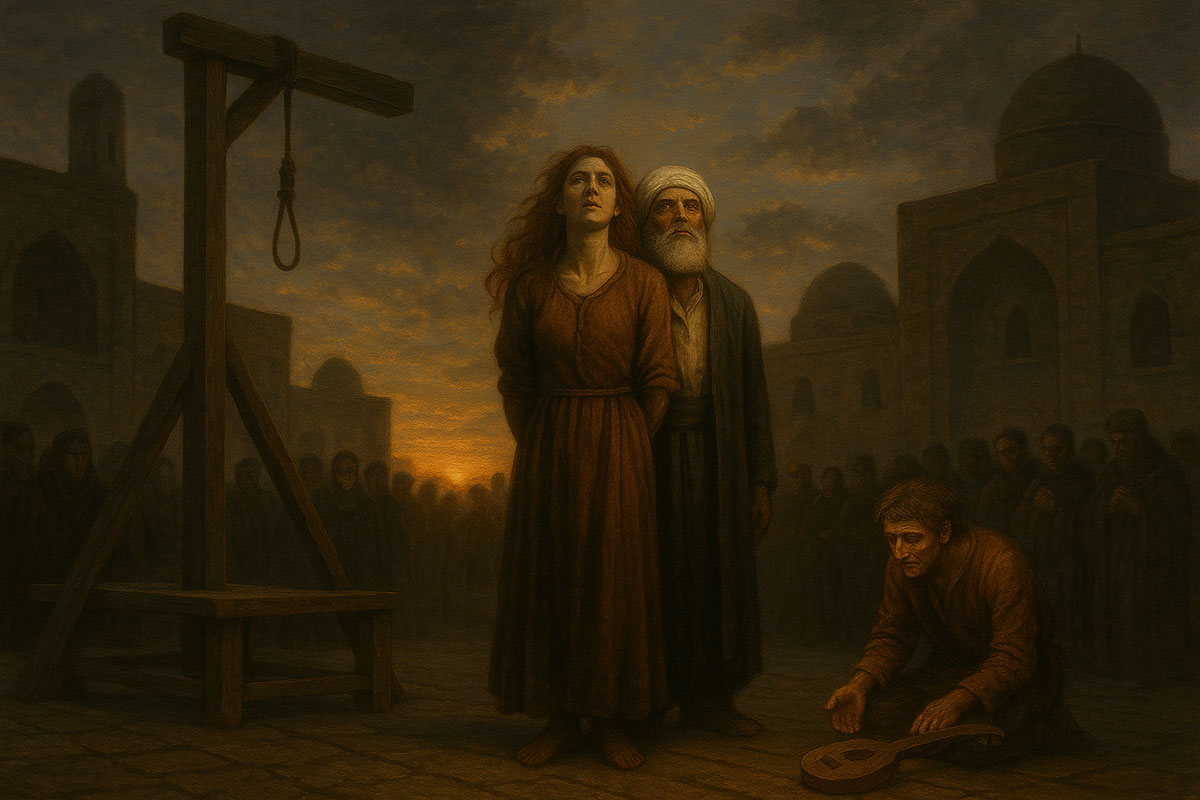
Scene 1 — The Execution Square at Dawn
Gray light seeps like cold tea. A scaffold waits: clean timber pretending innocence. Citizens arrive in knots—merchants, porters, mothers with shawls, a beggar with last night’s bread in hand. The Fool hovers at the edge, cracked lute and bent spoon tucked like poor relics. Drums sound—thin skin on a hollow morning.
First mother (to her child)
Look not, love. Hold the bread with both hands. Warm it as if it were a bird.
Second mother
If bread were king, it would spare us all.
Craftsman (wringing his cap)
I mocked the man because he showed me myself.
Now I would pay dear coin to forget the mirror.
Porter
We carry what is laid upon us.
To-day the load is our shame.
Chorus of citizens (low, braided, confessional)
We feared, so we obeyed.
We obeyed, so we became fear.
We set the stage and hired the blade.
We brought our children to the theatre of silence.
Guards enter with the Sorcerer. He is bareheaded, travel-worn; his eyes hold the remains of night and the first thought of day. He coughs once—human, not heroic. A priest opens a scroll and finds in it only his own voice.
Herald
By order of the Emir of Samarkand:
this man—who troubled peace with wonder—
shall give his breath to judgment at first light.
Sorcerer (to the crowd, mild as water)
Peace that fears a question is only sleep.
Wake gently, or you will tear what you mean to mend.
Young student (breaking forward)
Master—what shall I read when you are gone?
Sorcerer (kind)
Read the silence after crowds.
It speaks for those who spent their words too soon.
Fool (half aside, half prayer)
And if it will not speak, I will—
till my tongue is ash and still pretends to sing.
A drumbeat. The Sorcerer kneels at the post. A guard binds his wrists loosely, as if afraid to be remembered by rope. The blade gleams like an argument that thinks itself pure.
Scene 2 — Zara’s Cry
A swell at the edge of the square. Citizens part like grass cut by invisible scythes. Zara bursts through—veil gone, hair a dark shout. Two attendants follow, outpaced by grief.
Zara (throwing herself forward)
Hold! If truth must bleed, begin with me—
for truth has raised its house within my heart!
Captain (startled, lowering the blade)
Lady—
Priest (furious)
Seize her! She profanes the rite!
Zara (to the Sorcerer, hands on his shoulders)
Beloved—do not send me back to life alone.
If law calls this mercy, let it learn my name.
Sorcerer (urgent, tender)
Live—carry the stars—do not spend them here—
Zara (fierce, near tears, not yielding)
Your courage taught me how to spend.
I purchase morning with myself.
Emir (appearing above on the loggia, voice split between throne and blood)
Zara—
(turning to the square)
Make way—
(to the captain, choking)
Remove her—gently—if such a word exists!
Chorus (rising, a trembling of one breath)
Do not—do not—do not—
Fool (to the guards, stripped of jest)
If you spill her, the city drowns in a thimble.
Captain (to himself)
I am a tool. God forgive tools.
Time stumbles. Hands try to be many things at once. The blade wavers, conscience wavers, breath wavers. Zara folds herself over the Sorcerer’s back like a vow. The stroke falls—swift, then slow as a thunder remembered. A woman’s cry, a man’s; a red fan opens and shuts like some cruel flower. Who took it first—no eye can swear. Sound rushes out of the world, then finds its way back ashamed.
Chorus (shattered whisper)
O—
The wind takes a step and sits. Two bodies lean against the post in a posture sleep never learned.
First mother (weeping)
Cover the girl—
Cover our shame—
Beggar (touching the Sorcerer’s fingers, then his brow)
He put bread in my hand while I slept.
Let my waking be worth the gift.
Farid (young merchant, furious at his tears)
I asked him if truth could buy bread.
Now I have bread I cannot eat.
Craftsman (to no one, or to God)
I hammered my fear into a law.
It fits too well.
The guards back away as if the scaffold were contagious. The priest opens his mouth, finds only smoke.
Scene 3 — The Chorus Accuses and Confesses
The citizens, as one body with many throats, try on words. They do not fit; then they do. The rhythm finds them, like a drum that remembers their ribs.
Chorus of citizens (call and answer, soft at first, then steadier)
Who killed? — We did.
Who ordered? — Fear did.
Who crowned fear? — We did.
What did we save? — Nothing we can hold.
What did we lose? — More than we will name.
Porter (lifting a blanket with the bread-seller)
Help me—gently.
The earth has enough rudeness.
Bread-seller (ashen, stubborn)
I will sell still.
If I stop, fear wins twice.
Young student (on his knees, book clasped like a heart)
He warned us and we built the warning’s grave.
Fool (finding voice, rough, true)
Then feed the dead with your vow.
Live so that bread need not wash in blood.
Do not make altars of excuses.
The wind lifts a corner of Zara’s hair; it glints once, like a thought that refuses to die, then lies still. From the palace, the Emir is no longer visible. The square tilts toward those unseen rooms as if pulled by grief with weight.
Scene 4 — The Emir Alone
A private chamber not far above the square. The crown lies crooked on a table; the wooden doll sits beside it, scarred by old laughter. The Emir kneels, not to God alone, but to the truth of what he has done. He takes the doll with both hands as if it might break the silence for him.
Emir
I built my house with fear for mortar.
It stands.
Everything within it fell.
Zara—little wolf—
you bit this doll and taught me joy was brave.
Now joy will not look at me.
Stranger—enemy—prophet—
you showed me crawling in the ash.
I called you liar and then proved you true.
(he presses the doll to his eyes)
God of measures—
measure me small and forgive me large.
I loved my child and called it law;
I loved my throne and called it love.
Teach me to carry what I have broken
without blessing the shards.
(he sets the doll down carefully)
What is a crown?
A ring that widens till it fits no human head.
What is a father?
A man who learns too late that mercy is the only throne.
(he does not rise)
A pale bar of light crawls across the floor and stops at his knees like a messenger that dares come no nearer.
Scene 5 — The Fool’s Epilogue
Back in the square. The bodies are covered. The crowd has not dispersed; it has changed into people. The Fool walks to the post and kneels. He lays his cracked lute on one side, his bent spoon on the other, like poor offerings that know they are poor.
Fool (quiet, without costume in his voice)
I began with jests because they cost little.
I end with none because the price is paid.
(to the covered forms)
You taught me a tune. You took the music with you.
(to the citizens)
Hear what remains.
He plucks the lute. The bawdy melody from Act I comes back—mended by grief, missing notes. He hums where strings will not answer, then lets the sound go thin and honest. Silence follows—good silence, the kind that listens.
Fool (turning outward, to us)
We feared the stars, and so we buried the light.
We feared the question, and so we sharpened answers till they bled.
We feared our daughters, and so we taught them chains.
(he looks from face to face)
You—yes, you with breath warm in your chest—
do not wait for kings to bless your eyes.
Do not purchase sleep with another’s dawn.
You are watching yourselves.
(he gestures to the scaffold, to the covered shapes, to the morning)
Remember a little longer than crowds remember.
Work a little kinder than fear permits.
Carry a bucket while the fire is far,
so when it comes near your hands already know the weight.
Chorus of citizens (not loud, but sure, learning their own words)
We feared, so we obeyed.
We obeyed, so we became fear.
Let us fear less.
Let us obey better things.
Let us build a city with doors for daughters
and windows opening on the sky.
Fool (almost smiling, tired and tender)
Amen to doors. And windows.
(he sets the spoon at the base of the post)
Here—let this crooked thing be straight enough
to point you toward the morning.
Dawn thickens by a breath. A single bird finds a note and keeps it. The wind, done with its sermon, sits down. The square does not cheer. It stands—and standing is a new courage. People turn homeward one by one, slowly, as if carrying fragile water.
The Oracle appears at the far edge, veiled, still. Her voice is a thread pulled through silence.
Oracle
The man who bore both night and dawn has gone.
Who now will carry the day?
She fades like smoke that refuses to stain. The spoon catches sunlight and throws a thin, defiant stripe up the post.
Fool (very softly, to the covered forms and to us)
Sleep, lights.
We will learn to see.
[End of Act V]
Epilogue By Shakespeare
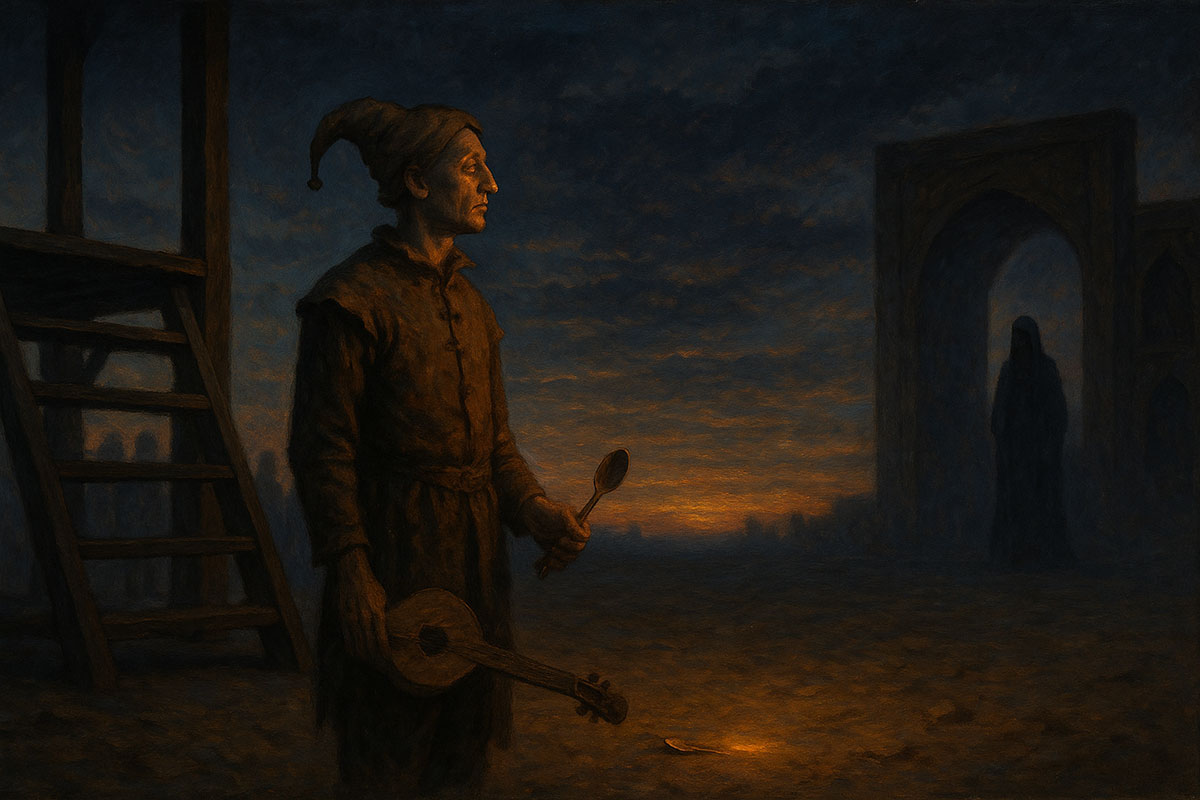
Thus ends our scene, where fear did wear a crown,
And truth, unbowed, was sharpen’d to a blade.
A father, torn, did learn too late his loss;
A daughter, bold, did wed her flame to death.
The stranger, proud, did pay his pride in blood,
And we, who watch, must number in the debt.
O think not Samarkand so far away;
Each town that trembles at an honest voice
Builds scaffold, law, and silence just as swift.
Each king that cloaks his mercy under fear
Shall crawl through ashes in his dream at night.
Each Fool that jests to buy a crust of peace
Must break his song and show his heart undone.
Yet mark, good friends—though crowns may crack like clay,
And daughters fall where fathers could not yield,
Still courage plants her banner in the dust.
For bent spoons shine, and broken lutes can sing,
And in the silence after tyrants speak
There stirs the question none can kill: What now?
If this you carry hence with beating hearts,
Then all our labour hath not starved in vain.
Gentle friends, applaud, and let the play be done.
Dramatis Personae:
The Sorcerer
A weary traveler of the desert, carrying “both night and dawn” in his eyes. Proud in truth, tender in humanity. His tragic flaw is the pride of truth-telling: noble yet blinding, it drives him to defy rulers and courts until silence becomes his end.
Zara
Daughter of the Emir, courageous and questioning. Her rebellion springs not only from love but from hunger for knowledge and freedom. She is Antigone and Juliet fused: fierce, tender, defiant, willing to embrace death rather than betray truth.
The Emir
Ruler of Samarkand, father of Zara. Torn between throne and blood, fear and admiration. Haunted by dreams of ruin, he condemns the Sorcerer in an effort to protect his rule, only to find his own daughter destroyed by the same stroke. His humanity is revealed in private soliloquies, clutching Zara’s childhood doll.
The Fool
Marketplace jester with cracked lute and bent spoon. Begins in bawdy jest, mocking merchants and clerics. Gradually sharpens into truth-teller, his humor collapsing into sorrow. In the end, he sings a broken version of his first tune, lays down spoon and lute, and tells the audience directly: “You are watching yourselves.”
The Oracle
A veiled seeress whose refrain repeats throughout: “The man who carries both night and dawn shall bless daughter and curse throne.” Her riddles foreshadow both Sorcerer and Zara’s fate. She appears at the prologue, trial, and epilogue — more presence than participant, a haunting voice of inevitability.
The Chorus (Citizens of Samarkand)
Merchants, mothers, craftsmen, beggars, children. They shift between awe, fear, and confession. Their chants grow rhythmic in the trial, drumming like a heartbeat of complicity. By the end, they confess: “We feared, so we obeyed. We obeyed, so we became fear.”
The Priest
Voice of dogma and fear. Declares the Sorcerer’s visions heresy, inflames the crowd against him. Rigid, certain, unyielding.
Council of Scholars
- Cautious Merchant: fears marvels will bankrupt trade.
- Young Student: longs for knowledge, admires the Sorcerer, but trembles under fear.
- Elder Scholar: wary voice of tradition, resisting change.
Together they reflect Samarkand’s divided intellect.
Farid
A young merchant, symbolic everyman. Begins defending the Sorcerer, then betrays him out of fear. His arc mirrors society’s weakness when confronted with danger.
Mothers, Craftsmen, Guards, Beggars, Attendants
Secondary figures whose lines anchor the allegory in daily reality. A craftsman mutters he hammered fear into law; a mother hushes her child; a guard trembles though binding loosely. They humanize the Chorus’s voice of guilt.

Leave a Reply